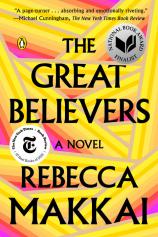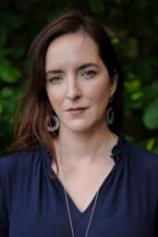Excerpt
Excerpt
The Great Believers

Nothing Yale could find words for was worth saying.
Fiona told him to check out the upstairs when he got a chance. “It’s Versailles up there.”
Yale couldn’t find Charlie in the crowd. Despite exuding tremendous height, Charlie was only a bit taller than average—and Yale was always surprised in situations like this not to spot his crew-cut head, his neat beard, his droopy eyes, above everyone else.
But Julian Ames was beside him now, down from upstairs. He said, “We’ve been going since lunch! I’m sloshed!” It was five o’clock, the sky already inking itself out. He leaned against Yale and giggled. “We ransacked the bathrooms. He has nothing, or else he’s hiding it. Well, someone found some old poppers in the back of the fridge. But is there any point to poppers if you aren’t getting laid?”
“No. Jesus. Poppers?”
“I’m asking seriously!” Julian pulled himself straight. He had a lock of dark hair in front that Charlie maintained made him look like Superman. (“Or a unicorn,” Yale would add.) He brushed it out of his eyes and pouted. Julian was too perfect, if anything. He’d had a nose job when he left Atlanta—better for his acting career—and Yale wished he hadn’t. He’d have preferred an imperfect Julian.
“I’m answering seriously. There’s absolutely no point to doing poppers at a memorial.”
“But this isn’t a funeral, it’s a party. And it’s like—” Julian was close again, conspiratorial in his ear. “It’s like that Poe story, the Red Death one. There’s death out there, but we’re gonna have a fabulous time in here.”
“Julian.” Yale drained the Cuba libre and spat an ice chip back into the glass. “That is not the point. That’s not how the story ends.”
“I was never one to finish my homework.”
Julian put his chin on Yale’s shoulder—a thing he was prone to do, one that always made Yale worry Charlie would glance over right then. Yale had spent the past four years reassuring Charlie he wouldn’t run off with someone like Julian, or like Teddy Naples, who was now leaning out precariously over the railing, his feet off the ground, calling to a friend below. (Teddy was so small that someone could probably catch him if he fell, but still, Yale cringed, looked away.) There was no reason for Charlie’s insecurity, beyond both men’s looks and flirtatiousness. Beyond the fact that Charlie would never feel secure. Yale had been the one to propose monogamy to begin with, but Charlie was the one who dwelt on its possible unraveling. And he’d picked the two most beautiful men in Chicago to affix his anxieties to. Yale shrugged Julian off his shoulder, and Julian smiled dopily and wandered away.
The room had loudened, the sound bouncing off the stories above, more people flooding in. Two very pretty, very young men circulated with trays of little quiches and stuffed mushrooms and deviled eggs. Yale wondered why the food wasn’t Cuban, too, to match the drinks, but Richard probably had just one plan for every party: Open the doors, open the bar, boys with quiche.
In any case, this was infinitely better than that strange and dishonest vigil last night. The church had smelled nicely of incense, but otherwise there was little about it Nico would have liked. “He wouldn’t be caught dead here,” Charlie had said, and then he’d heard himself and tried to laugh. The parents had carefully invited Nico’s lover to the vigil, saying it was “an appropriate time for friends to pay respect.” Meaning, don’t come today to the actual mass. Meaning, don’t really even show up for the vigil, but aren’t we generous? But Terrence had gone last night, and so had eight friends. Mostly to surround Terrence, and to support Fiona, who, it turned out, had convinced her parents to issue the invitation; she’d told them that if Nico’s friends weren’t invited, she’d stand up during the service and say so. Still, plenty of friends had bowed out. Asher Glass had claimed his body would revolt at setting foot in a Catholic church. (“I’d start yelling about rubbers. Swear to God.”)
The eight of them sat shoulder to shoulder in the back, a phalanx of suits around Terrence. It would have been nice if Terrence could have blended in anonymously, but they weren’t even seated yet when Yale heard an older woman pointing him out to her husband: “That one. The black gentleman with the glasses.” As if there were another black guy in this church, one with perfect vision. That woman wasn’t the only one who kept glancing back throughout the service to observe, anthropologically, when and if this gay black specimen might start weeping.
Yale held Charlie’s hand low down—not as a statement, but because Charlie was so allergic to churches. “I see kneelers and hymnals,” he said, “and five tons of Anglican guilt lands on my neck.” So, far below anyone else’s sightline, Yale had rubbed his wide thumb over Charlie’s bony one.
Family members told stories only about Nico as a child, as if he’d died in adolescence. There was one good one, told by Nico’s stoic and ashen father: Fiona, when she was seven, had wanted twenty cents to buy a handful of Swedish Fish candy from the bin on the counter of the convenience store. Their father pointed out that she’d already spent her allowance. Fiona had started to cry. And Nico, who was eleven, sat down in the middle of the aisle and, for five minutes, twisted and yanked at his barely loose molar until it came out. It bled—and their father, an orthodontist, was alarmed at the jagged root still attached. But Nico pocketed the tooth and said, “The Tooth Fairy’s bringing a quarter tonight, right?” In front of Fiona, Dr. Marcus couldn’t say no. “So can you give me a loan?”
The crowd laughed at this, and Dr. Marcus barely needed to explain that Nico gave the money straight to his sister, that it was another year before the permanent tooth grew in.
Yale looked now for Terrence. It took a minute, but there he was, sitting halfway up the stairs, too surrounded for Yale to chat with him yet. Instead, Yale took one of the mini quiches off a passing tray and slipped it to him through the balusters. “You look stuck!” Yale said, and Terrence put the quiche in his mouth, held his hand out again, said, “Keep ’em coming!”
Fiona had wanted to trick her parents, to exchange Nico’s ashes with fireplace ones and give the real ones to Terrence. It was hard to tell if she was serious. But Terrence wasn’t getting any ashes, and he wasn’t getting anything else either, besides Nico’s cat, which he’d taken when Nico first went into the hospital. The family had made it clear that when they began dismantling Nico’s apartment tomorrow, Terrence would be excluded. Nico had left no will. His illness had been sudden, immediately debilitating—first a few days of what had seemed like just shingles, but then, a month later, moon-high fevers and dementia.
Terrence had been an eighth-grade math teacher until this summer, when Nico needed him around the clock and Terrence learned he was infected himself. And how would Terrence get through the fall, the winter, with no Nico, no job? It wasn’t just a financial question. He loved teaching, loved those kids.
Terrence had some of the vague early symptoms, some weight loss, but nothing serious yet, not enough to go on disability. He’d taken the test after Nico got sick—whether out of solidarity or just to know, Yale wasn’t sure. It wasn’t as if there were some magic pill. Yale and Charlie had, just on principle, been among the first to get tested that spring. Charlie’s paper had been advocating for testing, education, safe sex, and Charlie felt he had to put his money where his mouth was. But on top of that, Yale had just wanted to get it over with. Not knowing, he figured, was bad for his health in and of itself. The clinics weren’t giving the test yet, but Dr. Vincent was. Yale and Charlie opened a bottle of champagne when they got the good results. It was a somber toast; they didn’t even finish the bottle.
The Great Believers
- Genres: Fiction
- paperback: 448 pages
- Publisher: Penguin Books
- ISBN-10: 073522353X
- ISBN-13: 9780735223530







